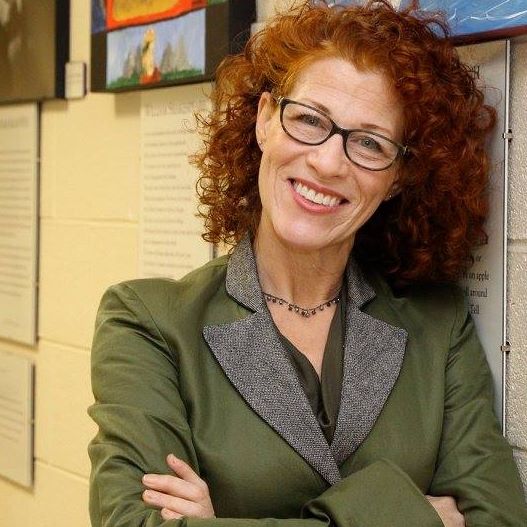Laura McCullough, professor of English at Brookdale Community College, had her eighth book of poetry, Women & Other Hostages, published by Black Lawrence Press. “These are riveting, wholly moving narratives of a life lived,” said Suzanne Frischkorn, poet, editor, and author of seven poetry collections. “Out of sorrow, McCullough invokes a stunning grace where ‘what is stripped from you’ becomes a gift because ‘what’s left behind is all your own.’ This beautiful book will knock loose what is lodged in your heart.”
As a child, McCullough’s mom read to her every night from the book Best Loved Poems of the American People by Hazel Felleman. She also read from the book McCullough still has from her childhood, The Golden Treasury of Poetry edited by Louis Untermeyer and illustrated by Joan Walsh Anglund, a mid-century children’s artist. When McCullough’s mom passed away, she got two tattoos from the beautiful illustrations in the book to commemorate her death.
In McCullough’s recent two books, she finds passage through the darkest times. Billy Collins selected her seventh book, The Wild Night Dress, as a finalist for the 2017 Miller Williams Poetry Prize. This book was written after she lost, in short order, her mother and her marriage. “Through her near unbearable grief, she creates poems that slip between science and nature as she grasps at coordinates in a world spun out of its orbit,” said The University of Arkansas Press. “McCullough brings readers to the mystery of surrender, and the paradox that what we bear can make us more beautiful, that there is a gift in grief.”
The gift of grief has made McCullough a better, more compassionate teacher. “I began to change my curriculum to be much more sensitive to the invisible trauma and suffering in people’s lives and what my students might be facing,” she said. “I transmuted my pain into compassion, and my curriculum in the English department now is based on trauma-informed, whole student-directed, wellness enhancing curriculum infused into English classes.” When COVID hit, this curriculum turned out to be precisely on target.
Robert Frost said, “You have to write out of grief, not grievance.” McCullough explained that today, in particular, creative writing students often want to come to their poetry with grievances. “They are angry at cultural things, political things, a personal life event, yet what makes something accessible to others is usually the emotional grief, not the didactic: why their dad was wrong, the President was wrong, or the government was wrong. It is not that those things cannot be in a poem, but the grief that is underneath all of it is the universal connector. As Robert frost also said, ‘No tears in the writer, no tears in the reader, no discovery in the writer, no discovery in the reader.’ If the writer drills down into the universal truths of their grief, the reader will feel that sense of discovery, and it will enliven them.”
McCullough has her MFA (Master of Fine Arts Degree) in fiction from Goddard College. She did not think of herself as a poet but did study as an undergraduate with Stephen Dunn, a Pulitzer Prize and Academy Award-winning American poet. He continued to be her mentor and friend until his recent death, and he was the first writer she brought to Brookdale when she founded the Visiting Writers Series. In addition to her own creative work, McCullough has edited two anthologies for University Presses, one on her mentor, and The Room and the World: Essays on Stephen Dunn (Syracuse University Press) and a socially and politically relevant one, A Sense of Regard: Essays on Poetry and Race (University of Georgia Press).
Born and raised in New Jersey, McCullough’s first poem was called “Pump Your Own Gas”. “And literally, included in it was the issue of pumping your gas on the Garden State Parkway,” she said. “It was instantly taken, and somehow that thrust me toward becoming a poet,” and in 2009, her first book was taken. Between then and now, there have been eight full length collections published by independent and university presses, four chap books, and the two university press anthologies. Three of McCullough’s books are on the Jersey Shore, and two are “very located” in Asbury Park. Women & Other Hostages has several poems located on Cookman Avenue and the restaurant Porta. Her book Jersey Mercy is all about growing up in Eatontown, Long Branch, Red Bank, and Asbury Park; though she did not personally grow up there, her poems draw on her own girlhood, the Jersey Shore life, and people she had known and loved here, yet, she says, “The Jersey Shore itself is the main character.” Her book Panic is about the Jersey Shore and was McCullough’s response to 9-11.
Usually, McCullough is working on multiple writing projects and manuscripts at a time and is always simultaneously writing and reading. She said she usually reads 4-5 books simultaneously, and she is constantly researching. “I read voraciously,” she said.
“Sometimes someone will ask to me explain one of my own poems,” McCullough said, “And I say no, if I could explain it, I would have written an essay instead of a poem. The poem is an attempt to bridge the intellectual, the linguistic, the spiritual, and head and the heart to be a meaning-making artifact that cannot exactly be quantified or broken down into components.”
Together the poet and the publisher decide on the artist for the cover. For this latest book, Women & Other Hostages, they chose Kyle Mosher, a collage artist. “Both of us fell in love with his collage called The Lady of Snakes,” said McCullough. “The prologue poem was written to go along with that cover. It was not part of the original manuscript the publisher had chosen and accepted. I was delighted that they wanted to have a snake as an interior illustration. I have a snake tattoo. Snakes are a symbol of growth and productivity and also a symbol of treachery, so there is a paradox in that, like much of life.”
McCullough’s favorite part of this new book is a section at the end she called, Gratitudes, where she went a little bit further than she usually would. Instead of a listing editors and professional connections, she listed people who indeed helped her through the long dark night that led to this book come into being.
In the book, her favorite poem is from a long poem cycle titled “Marriage”. (how to hold a heart) on page 76. McCullough’s motivation comes from people first, and she studies and researches human nature, then the poems flow. Li-Young Lee, a poet she respects greatly, once said, “All poems are love poems.” “I would agree with that,” McCullough said.
McCullough was the founder of the Creative Writing Program at Brookdale and the Visiting Writers Series, which she ran for eight years before passing it on to fellow writing faculty. McCullough currently teaches ENG 121 English Composition: the writing process, ENG 122 English Composition: Writing and Research, as well as Creative Writing and Fiction Workshops.
###
Marriage (how to hold a heart)
As if lifting cupped hands to drink,
or roasted duck, an owl’s feathers, beak
to cheek. Not like an apple or a baseball.
A lost think in mud found. A blessing
in the surf you cast yourself into, a dying
face that still has bones. The way you try
to recall details of a dream, not grasping.
A walking on the air leading you somewhere
you didn’t know you needed to go. Memory
in flesh. Not with your hands at all; with
your own muscle, everything you own.
 Bookstore
Bookstore  Self Service
Self Service  Video Library
Video Library 
